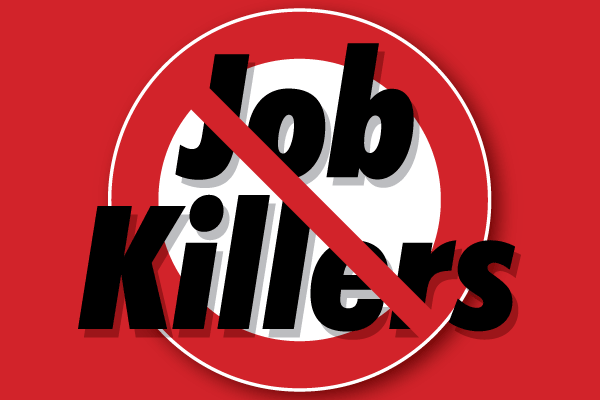A leave mandate job killer bill opposed by the California Chamber of Commerce is scheduled to be considered next week by a Senate committee.
SB 63 (Jackson; D-Santa Barbara) is set for hearing March 22 in the Senate Labor and Industrial Relations Committee.
SB 63, a more expansive version of a job killer bill vetoed last year, imposes a new maternity and paternity leave mandate.
Added Burden
The CalChamber has identified SB 63 as a job killer bill because it unduly burdens and increases costs of small employers with as few as 20 employees by requiring 12 weeks of protected employee leave for child bonding. It also exposes those employers to the threat of costly litigation.
The bill requires a California employer who employs as few as 20 employees within a 75-mile radius to provide 12 weeks of protected parental leave. Therefore, a worksite with only 5 employees will be required to accommodate the mandatory leave if there are other worksites in a 75-mile radius with enough employees to reach the 20 employee threshold, creating a hardship for employers with a limited number of employees at a worksite.
The proposed mandate comes on top of the current requirement that employers with as few as 5 employees allow up to four months of protected pregnancy-related leave. SB 63 will add another 12 weeks of leave for the same employee, totaling seven months of potential protected leave.
Litigation Threat
The SB 63 mandate exposes small employers to costly litigation under the Fair Employment and Housing Act (FEHA) by labeling failure to provide the 12-week parental leave of absence as an “unlawful employment practice.”
An employee who believes the employer did not provide the 12 weeks of protected leave, failed to return the employee to the same or comparable position, failed to maintain benefits while out on the 12 weeks of leave, or took any adverse employment action against the employee for taking the leave, could pursue a claim against the employer seeking: compensatory damages, injunctive relief, declaratory relief, punitive damages, and attorney’s fees.
A 2015 study by insurance provider Hiscox regarding the cost of employee lawsuits under FEHA estimated that the cost for a small to mid-size employer to defend and settle a single plaintiff discrimination claim was approximately $125,000.
Family-Friendly State
California already imposes numerous family-friendly leaves of absence on employers. The National Conference of State Legislatures recognizes California as one of the most family-friendly states given its list of programs and protected leaves of absence, including: paid sick days, school activities leave, kin care, paid family leave program, pregnancy disability leave, and the California Family Rights Act. This list is in addition to the leaves of absence required at the federal level.
A recent study titled “The Status of Women in the States: 2015 Work & Family” ranked California as No. 2 for work and family policies that support workers keeping their jobs and also caring for their family members. Imposing an additional 12-week, mandatory leave of absence targeted specially at small employers is unduly burdensome.
Action Needed
The CalChamber is encouraging members to contact their Senate representatives to urge them to oppose SB 63.
An easy-to-edit sample letter is available at www.calchambervotes.com.




